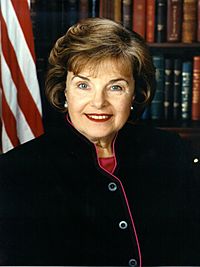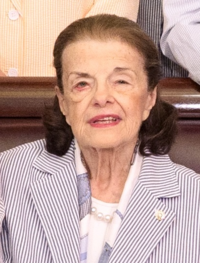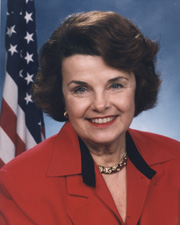Dianne Feinstein facts for kids
Quick facts for kids
Dianne Feinstein
|
|||||||||||||||||||||||||||||
|---|---|---|---|---|---|---|---|---|---|---|---|---|---|---|---|---|---|---|---|---|---|---|---|---|---|---|---|---|---|
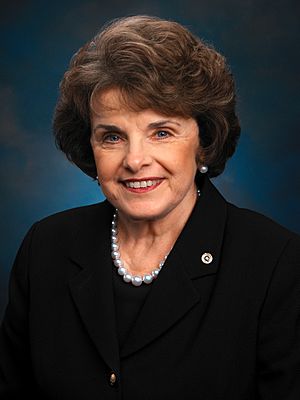
Official portrait, 2004
|
|||||||||||||||||||||||||||||
| United States Senator from California |
|||||||||||||||||||||||||||||
| In office November 4, 1992 – September 29, 2023 |
|||||||||||||||||||||||||||||
| Preceded by | John Seymour | ||||||||||||||||||||||||||||
| Succeeded by | Laphonza Butler | ||||||||||||||||||||||||||||
|
|||||||||||||||||||||||||||||
| 38th Mayor of San Francisco | |||||||||||||||||||||||||||||
| In office November 27, 1978 – January 8, 1988 |
|||||||||||||||||||||||||||||
| Preceded by | George Moscone | ||||||||||||||||||||||||||||
| Succeeded by | Art Agnos | ||||||||||||||||||||||||||||
| President of the San Francisco Board of Supervisors | |||||||||||||||||||||||||||||
| In office January 9, 1978 – December 4, 1978 |
|||||||||||||||||||||||||||||
| Preceded by | Quentin L. Kopp | ||||||||||||||||||||||||||||
| Succeeded by | John Molinari | ||||||||||||||||||||||||||||
| In office January 8, 1974 – January 8, 1975 |
|||||||||||||||||||||||||||||
| Preceded by | Ron Pelosi | ||||||||||||||||||||||||||||
| Succeeded by | Quentin L. Kopp | ||||||||||||||||||||||||||||
| In office January 8, 1970 – January 8, 1971 |
|||||||||||||||||||||||||||||
| Preceded by | John A. Ertola | ||||||||||||||||||||||||||||
| Succeeded by | Ron Pelosi | ||||||||||||||||||||||||||||
| Member of the San Francisco Board of Supervisors | |||||||||||||||||||||||||||||
| In office January 8, 1970 – December 4, 1978 |
|||||||||||||||||||||||||||||
| Preceded by | William Blake | ||||||||||||||||||||||||||||
| Succeeded by | Louise Renne | ||||||||||||||||||||||||||||
| Constituency |
|
||||||||||||||||||||||||||||
| Personal details | |||||||||||||||||||||||||||||
| Born |
Dianne Emiel Goldman
June 22, 1933 San Francisco, California, U.S. |
||||||||||||||||||||||||||||
| Died | September 29, 2023 (aged 90) Washington, D.C., U.S. |
||||||||||||||||||||||||||||
| Resting place | Colma, California | ||||||||||||||||||||||||||||
| Political party | Democratic | ||||||||||||||||||||||||||||
| Spouses |
|
||||||||||||||||||||||||||||
| Children | Katherine | ||||||||||||||||||||||||||||
| Parent |
|
||||||||||||||||||||||||||||
| Education | Stanford University (BA) | ||||||||||||||||||||||||||||
| Signature | |||||||||||||||||||||||||||||
Dianne Goldman Berman Feinstein ( FYNE-styne; born Dianne Emiel Goldman; June 22, 1933 – September 28, 2023) was an American politician. She served as a U.S. Senator for California from 1992 until her death in 2023. She was a member of the Democratic Party. Before becoming a senator, she was the Mayor of San Francisco from 1978 to 1988.
In the 2012 election, she received 7.86 million votes. This was the most votes ever received by a U.S. Senate candidate. Feinstein wrote the 1994 Federal Assault Weapons Ban. She was the first woman to lead the Senate Rules Committee and the Senate Intelligence Committee. She was also the first woman to lead a U.S. presidential inauguration. Feinstein led the Senate Intelligence Committee from 2009 to 2015. She was the top Democrat on the Senate Judiciary Committee from 2017 to 2021.
At 90 years old, she was the oldest sitting U.S. senator. She was also the longest-serving U.S. senator from California. She was the longest-serving female senator in history. In February 2023, Feinstein announced she would not run for re-election in 2024. She passed away in office on September 28, 2023.
Contents
Early Life and Education
Dianne Emiel Goldman was born on June 22, 1933, in San Francisco, California. Her father, Leon Goldman, was a well-known surgeon. Her mother, Betty (née Rosenburg), was a former model. Her grandparents on her father's side were Jewish immigrants from Poland. Her mother's grandparents were from Russia.
Feinstein went to Convent of the Sacred Heart High School. She graduated in 1951. She then attended Stanford University, graduating in 1955. She earned a Bachelor of Arts degree in history.
Early Political Career
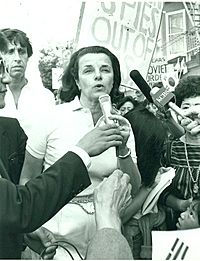
Feinstein was elected to the San Francisco Board of Supervisors in 1969. In 1978, she became the board's first female president. During this time, the mayor and a city supervisor were assassinated. Feinstein then became the Mayor of San Francisco. She was the first woman to hold this position.
As mayor, she led the repair of the city's cable car system. She also oversaw the 1984 Democratic National Convention. Even after a recall attempt in 1983, Feinstein was a popular mayor. In 1987, she was named the most effective mayor in the country.
After losing a race for governor in 1990, Feinstein was elected to the U.S. Senate. This happened in a special election in 1992.
U.S. Senate Career
In November 1992, Feinstein became California's first female U.S. senator. She was reelected five times during her career.
Feinstein was known for her work on gun control. In 1994, she helped pass a federal ban on assault weapons. In the 2000s and 2010s, she investigated the CIA's detention and interrogation program. This program was put in place after the September 11 attacks.
In 2009, Feinstein led the first inauguration ceremony for President Barack Obama. She was the first woman to lead the Senate Rules Committee (2007–2009). She was also the first woman to lead the Select Committee on Intelligence (2009–2015). In 2017, Feinstein became the top Democrat on the Senate Judiciary Committee. She was the first woman to hold that role. On March 28, 2021, she became the longest-serving U.S. senator from California. On November 5, 2022, she became the longest-serving female senator in U.S. history.
Committee Work
Feinstein held important roles on several Senate committees. She was the first woman to chair the Senate Rules Committee (2007–2009). She also chaired the Select Committee on Intelligence (2009–2015). She became the top Democrat on the Senate Judiciary Committee in 2017.
Her committee assignments for the 118th Congress included:
- Committee on Appropriations
- Committee on the Judiciary
- Committee on Rules and Administration
- Select Committee on Intelligence
Political Views
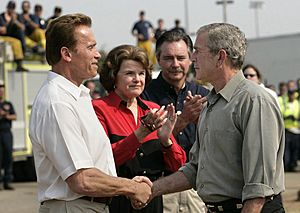
Feinstein was known for supporting gun control. She also worked to protect the environment. She believed in a strong national defense.
Gun Control
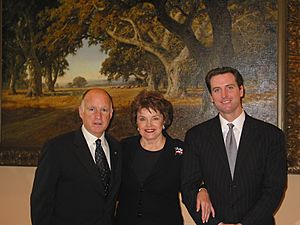
Feinstein introduced the Federal Assault Weapons Ban. This law passed in 1994 but expired in 2004. In 2013, she proposed a new bill. It would ban the sale of certain firearms. These included semi-automatic rifles with specific features. The bill would have allowed 900 models of guns for sport and hunting. However, the bill did not pass in the Senate.
Health Care
Feinstein supported the Affordable Care Act (ACA). She voted many times to protect it. She also voted to expand the Children's Health Insurance Program (SCHIP). She supported allowing patients to sue HMOs. She also wanted Medicare to cover prescription drugs.
In 2017, Feinstein said she did not support a single-payer health insurance system. This would mean the government would completely take over all health care. She believed that health care reform needed compromise. She thought Democrats and Republicans should work together.
Immigration
In 2017, Feinstein said the Deferred Action for Childhood Arrivals (DACA) program was legally questionable. She believed a new law was needed to protect young immigrants. In 2018, she worried that some immigration decisions were based on race. She pointed to comments made about African countries.
Marriage Equality
In 1996, Feinstein voted against the Defense of Marriage Act (DOMA). This law defined marriage as only between a man and a woman. In 2011, she introduced a bill to cancel DOMA. In 2022, she supported the Respect for Marriage Act. This law made sure that same-sex and interracial marriages were recognized by the federal government and all states.
National Security
Feinstein was known for her strong views on national security. She voted to extend the Patriot Act and FISA laws in 2012. These laws allow for certain types of government surveillance.
After Edward Snowden leaked information in 2013, Feinstein called him a "traitor." She supported programs that collected information. She said this information was used to connect phone lines to terrorists. She also said it did not include the content of calls.
However, she criticized the CIA for looking at files on Congress members' computers. She said this might have violated the Constitution. In 2020, Feinstein supported the EARN IT Act. This act aimed to create rules for websites. Critics said it could limit secure, private communications.
Awards and Honors
Feinstein received an honorary degree from Golden Gate University in 1977. In 1984, France awarded her the Legion of Honour. She received the Woodrow Wilson Award for public service in 2001. In 2002, she won the American Medical Association's Nathan Davis Award. This award was for improving public health.
Personal Life
Feinstein was married three times. Her first marriage was to Jack Berman in 1956. They divorced three years later. They had a daughter, Katherine Feinstein Mariano (born 1957). Katherine later became a judge. In 1962, Feinstein married neurosurgeon Bertram Feinstein. He passed away in 1978. Her third husband was investment banker Richard C. Blum. They married in 1980. He passed away in 2022.
Death
Dianne Feinstein passed away at her home in Washington, D.C., on September 28, 2023. She was 90 years old.
Images for kids
-
President Barack Obama signs the New START in the Oval Office, February 2, 2011. Feinstein is standing fourth from right.
-
Feinstein with President Donald Trump, John Cornyn, and Marco Rubio discussing school safety at the White House, February 28, 2018.
See also
 In Spanish: Dianne Feinstein para niños
In Spanish: Dianne Feinstein para niños
 | Madam C. J. Walker |
 | Janet Emerson Bashen |
 | Annie Turnbo Malone |
 | Maggie L. Walker |


